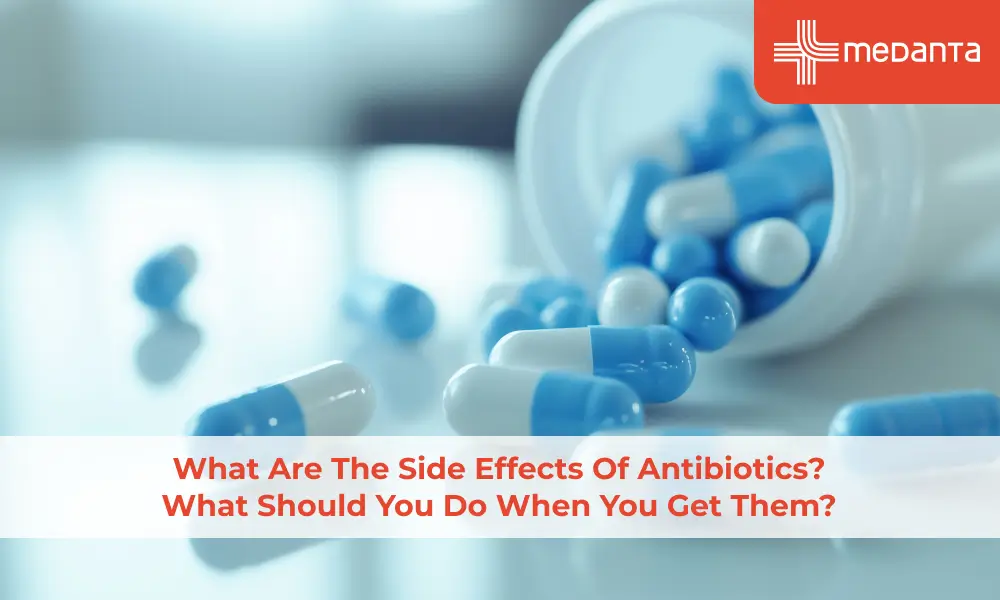What Are The Side Effects Of Antibiotics? What Should You Do When You Get Them?

TABLE OF CONTENTS
What are the common side effects of antibiotics?
Digestive symptoms - affect about 10% of the people taking antibiotics. The symptoms can be:
Vomiting
Feeling like vomiting
Loose watery stools
Abdominal bloating
Indigestion
Pain in the tummy
Loss of hunger
Allergic reactions - affect about 1 in 15 people. Some people develop adverse reactions to antibiotics that can be as simple as a rash to severe blisters and swelling or difficulty breathing
In rare cases, especially with injectable antibiotics, Anaphylactic reaction - A severe form of allergic reaction that is life-threatening can occur. Reach out to emergency if any of these symptoms develop:
Feeling dizzy or fainting
Difficulty in breathing
Wheezing
Fast heart rate
Confusion & Anxiety
Collapsing or loss of consciousness
difficile diarrhoea - C.difficile is a bacterium that infects your digestive system after the antibiotics kill the good bacteria that protect you. The infection is picked up from the environment through contaminated surfaces.
Fungal infections are due to the loss of good bacteria.
Interaction with alcohol
What are the side effects of specific antibiotics to look out for?
Tetracyclines - Skin sensitivity to light causing reactions to bright light.
Fluoroquinolones like Ciprofloxacin and Norfloxacin - Severe aches and pains, affecting joints, muscles and nerves. If you experience tendon, muscle or joint pain or get a pins and needles sensation, stop taking the medicine and consult your doctor right away. Fluoroquinolones can also cause problems in the heart, especially for people with valve problems.
Aminoglycosides like gentamicin, amikacin or streptomycin are known to cause hearing related problems including hearing loss.
Should I stop taking antibiotics if I have side effects?
Never stop taking antibiotics unless symptoms are extremely severe, and it's best to consult your doctor before making the change. This is because when you stop antibiotics mid-way, it causes a serious problem by promoting the growth of antibiotic-resistant bacteria which will be difficult to treat.
Why am I advised not to stop the antibiotic by myself mid-course?
Bacteria vary from each other through genetic differences like we human beings do. They also multiply very fast. This causes a big problem. When you have antibiotics only for a few days, the first bacteria to die out are the ones that are most sensitive to the antibiotic. When you complete your course, the antibiotic brings down the bacterial load to such a low level that any remaining antibiotic-resistant relatives of the bacteria are taken care of by your immune system before they get a chance to multiply.
When you quit taking antibiotics mid-course, the bacterial load is still high for the immune system alone to be able to manage. This gives a chance for the antibiotic-resistant bacteria to multiply and grow to a level that continues to overwhelm your immune system. This is dangerous because you will either have to use more intense antibiotics with even more serious side effects or you may not be able to recover from the infection properly.
You may also spread the infection to people who have low immunity and this could be life-threatening for them.
Can I take antibiotics myself?
This is tempting, as antibiotics look like a single-stop treatment. But, it really is not as simple. Antibiotics need to be given according to the requirement and the cause in exact quantities as the body can tolerate, adjusted for age and sometimes your body weight. If you take antibiotics for viral infections, you get no effect and only the side effects. Always consult your doctor, even if your neighbourhood pharmacist is a friend who will give you whatever you ask! You will be helping not just yourself, but also those around you.






